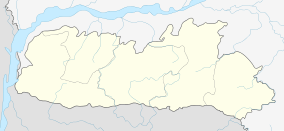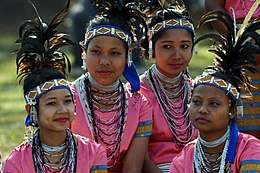Resubelpara
| Resubelpara Resu | |
|---|---|
| City | |
 Resubelpara Location in Meghalaya, India  Resubelpara Resubelpara (India) | |
| Coordinates: 25°53′40″N 90°35′59″E / 25.8943300°N 90.5997800°ECoordinates: 25°53′40″N 90°35′59″E / 25.8943300°N 90.5997800°E | |
| Country |
|
| State | Meghalaya |
| District | North Garo Hills |
| Government | |
| • Body | Resubelpara Municipal Board |
| Population (2001) | |
| • Total | 17,652 |
| Languages | |
| • Official | English |
| Time zone | UTC+5:30 (IST) |
| PIN | 794108 |
| Telephone code | 913659 |
| Vehicle registration | ML - 13 |
Resubelpara popularly known as Resu, is the headquarters of North Garo Hills District in the state of Meghalaya in India. This town is situated alongside the Damring River.
History
Resubelpara Administrative Unit was upgraded to a full·fledged Civil Sub-Division with effect from 30 April 1982 under Government Notification No HPL 539/81/11 dated 22 April 1982.
Demographics

As of 2001 India census,[1] Resubelpara. had a population of 17,652. Males constitute 51% of the population and females 49%. Resubelpara. has an average literacy rate of 68%, higher than the national average of 59.5%: male literacy is 69%, and female literacy is 66%. In Resubelpara., 17% of the population is under 6 years of age.
Transport
The nearest airport is at Guwahati and the nearest railway station is Mendipathar within Resubelpara Municipal Board Jurisdiction.
Places of interest
- Hot Spring, Bakra
- Joldang Wari Lake
- Rangdokram
- Shiv Susu (Lingam), Nokat
- Rangjokram Lake
- Dap
- Damring Beach, Dekachang
Schools and Colleges
Schools
- Montfort Higher Secondary School, Jonglapara
- Paschal Secondary School, Rong·dipìng,
- Government Higher Secondary School, Mepan A·bri
- Vineyard school, Nangaburi
- Government Girls' Higher Secondary School, Medical Colony, Nangaburi
- Resubelpara Government Boy's School.
- Dilma A'pal Secondary School,Dilma A'pal
- St. Thomas Higher Secondary School,Mendipathar, Resubelpara
- IL&FS Skills School, Dilma Apal, Resubelpara
Colleges
- Union College, Boda Apal, Resubelpara
- Mendipathar College, Mendipathar, Resubelpara
Professional Training Centres
- DIET, Nangaburi, Resubelpara
- ITI (Industrial Training Institute), Darampara, Resubelpara
People
Localities
- Songma.
- Rong·dipìng.
- Dekachang.
- Nangaburi.
- DC Colony.
- Medical Colony.
- Mepan A·bri.
- Chibagok.
- Jongla.
- Rongpetchi.
- Daram.
- Bakra(Hot Spring)
- BJN.
- Rebagre.
- Bolsaldam.
- Haluapara(hot spring)
- Babukona
Festivals
Awe Winter Festival This festival is celebrated in Resubelpara on the month of December and is organised by the District Administration North Garo Hills.
Millennium Festival This festival is celebrated in Resubelpara on the month of December. Number of competitions like Dancing, Rock Concert, Games, Fashion Show are organised here.
Wangala Wangala (also known as Hundred Drums, Wanna, Wanna rongchuwa) is the greatest Harvesting Festival among other festivals of Garos, who live in Meghalaya, India and Greater Mymensingh in Bangladesh. They give thanks to God and Goddess, called Misi Saljong, known as "Pattigipa Ra’rongipa" (Sun-God), for blessing the human beings with rich harvest of the season.
Wangala is celebrated two or three days or one week gathering two or three villages, though recently it has been celebrated for one day in metropolitan areas. "Rugala" and "Sasat Sowa" are celebrated on the first day. This is performed inside the house of the Nokma or Chief of the village. "Dama Gogata" is celebrated on the last day.
During Wangala, people young and old dress in their colourful (Dokmanda, Doksari, gando) with feathered headgear (do’mi) and dance to the tune of music played on long, oval-shaped drums (Dama).
"Katta Dokka" (talking in a singing style), "Ajea", Dani Dokka (describing Wangala by singing), Chambil Mesa or Pomelo Dance, etc. are performed during these days.
Wangala is celebrated in the months from September to December.
References
- ↑ "Census of India 2001: Data from the 2001 Census, including cities, villages and towns (Provisional)". Census Commission of India. Archived from the original on 2004-06-16. Retrieved 2008-11-01.